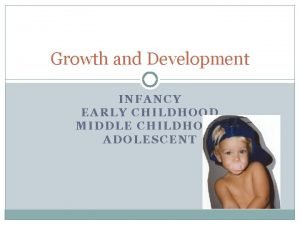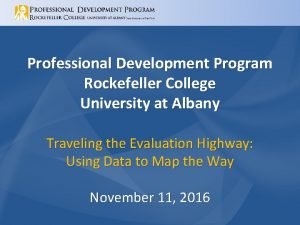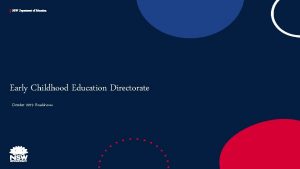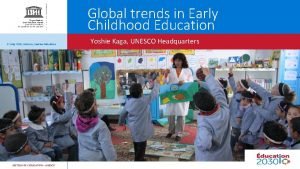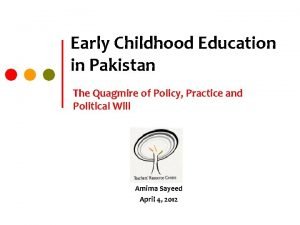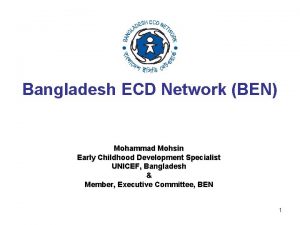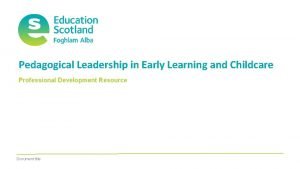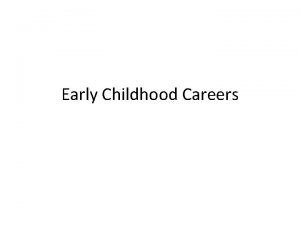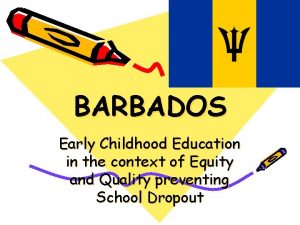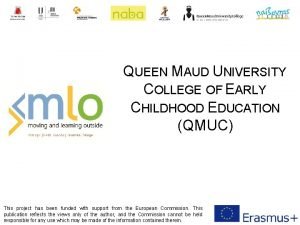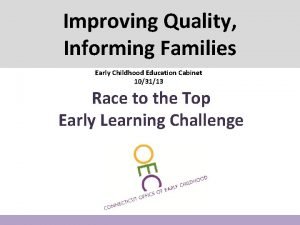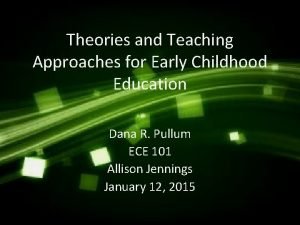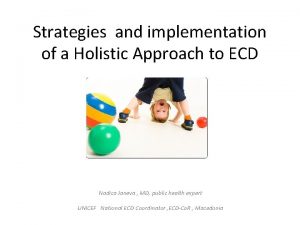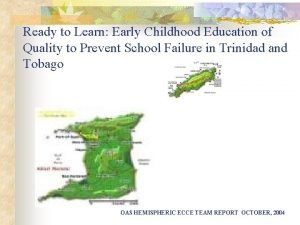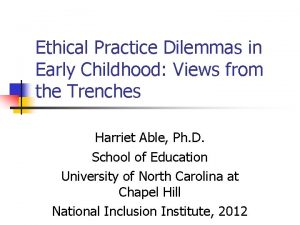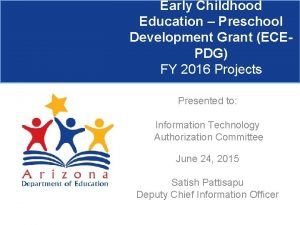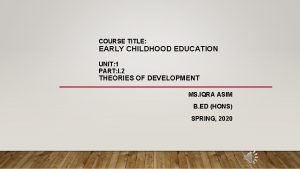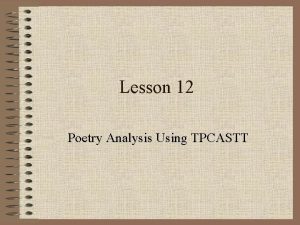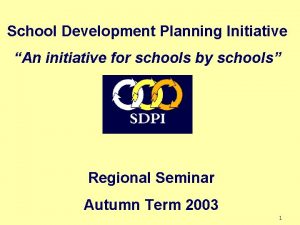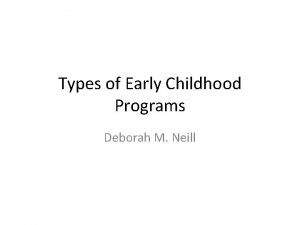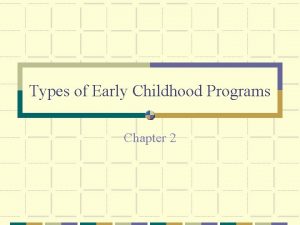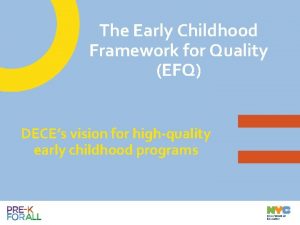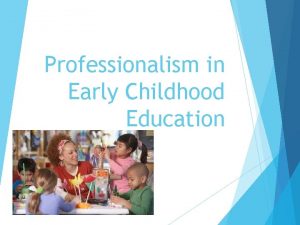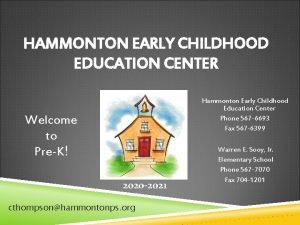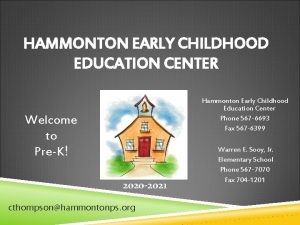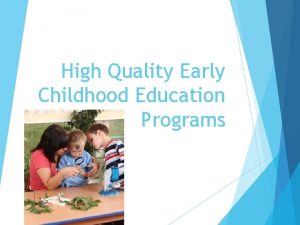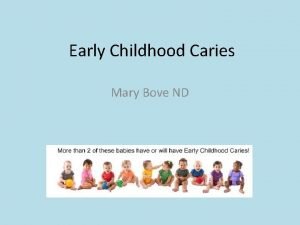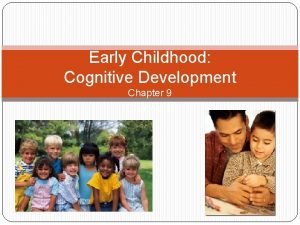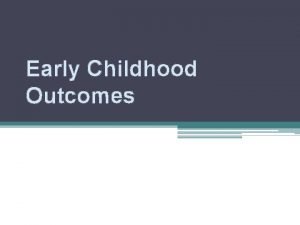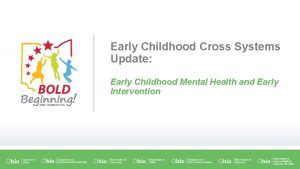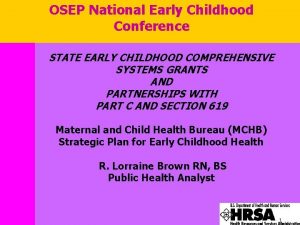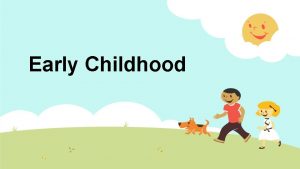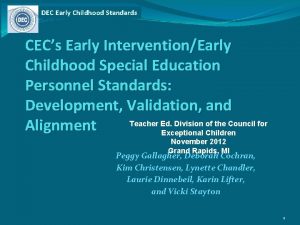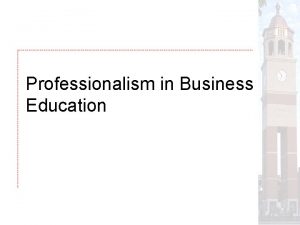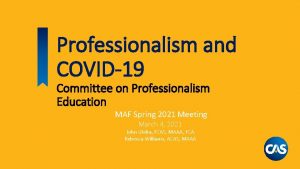Professionalism in Early Childhood Education Todays Agenda Understanding





















- Slides: 21

Professionalism in Early Childhood Education

Today’s Agenda Understanding what makes an early childhood education program developmentally appropriate What must early childhood educators know?

Anyone can teach young children: True or False? At your tables, please…. brainstorm and list why this statement may be false Brainstorm and list why this statement may be true Please post at least two reasons why this statement may be true, and two reasons why it may be false at http: //scrumblr. ca/early%20 childhood

Developmentally appropriate programs

What is a develop-mentally appropriate program? Age appropriate Individually appropriate Socially and culturally appropriate

Age Appropriate What are children like within a general age range? Used to develop routines, activities, expectations Are these age appropriate? Twenty 4 -year-olds have been in circle time for 40 minutes. Jamie, a kindergartner, laboriously copies a series of words onto lined paper.

Individually Appropriate What are the individual children like within a general age range? Used in design, application and evaluation of activities, interactions and expectations Is this developmentally appropriate? Suzanne wants the easel all to herself. Bianca wants a turn. The first-grade teacher helps the girls develop a plan for sharing.

Socially and Culturally Appropriate What are the sociocultural experiences of the children? Used in design, application and evaluation of activities, interactions and expectations Culture is defined by values, traditions and beliefs that are shared intergenerationally How should the teacher address this situation? Keiko eats rice for breakfast at home. During a nutrition activity in preschool, some children insist that rice is only a dinner food.

What must early childhood educators know?

Domains of Knowledge of child development and learning Content Knowledge of effective teaching strategies

Child Development is… Holistic Aesthetic Affective Cognitive Language Physical Social

Child Development is… Sequential Please put these milestones in order Fear of ghosts Fear of animals Fear of being embarrassed in front of others Stranger Varies anxiety in rate within and among children

Children’s Learning Is… Active Influenced by maturation Influenced by environment Influenced by a combination of physical experience, social interaction and reflection Promoted by play

Some Best Practices in Teaching Young Children Importance Firsthand of sensory engagement experiences are best Firsthand experiences should precede representational or more abstract experiences Models are more concrete than pictures; pictures are more concrete than words Plan activities so that sensory engagement occurs early in the process rather than later

Philosophies of Early Childhood Education

What is a philosophy of early childhood education? A self-reflective statement of your beliefs about teaching and learning for young children. In addition to general comments, your teaching philosophy should discuss how you put your beliefs into practice by including concrete examples of what you do or anticipate doing in the classroom.

Sample Philosophies of ECE Our Philosophy is based on the Piagetian Principle that children develop and learn in sequential stages by being actively involved in their environment. We provide an enriched environment that furnishes materials that can be used according to a child's developmental level. We encourage free choice in order to foster independence and develop confident and competent children. We encourage family involvement and work towards incorporating respect and dignity for every culture. UCI’s Early Childhood Education Center

Sample Philosophies of ECE Central to the philosophy of the Infant Toddler Center is the premise that children need to feel physically and emotionally safe in order to achieve their maximum potential in all areas of development. Parents, caregivers, and children form a respectful, responsive and reciprocal partnership with the goal in mind of providing as much continuity as possible between home care and day care. Of primary concern is the establishment of a strong emotional bond between caregivers and children. Additionally, we are interested in strengthening families to meet the varied demands of maintaining a career and a family in a rapidly changing world. UCI’s Infant Toddler Center

Sample Philosophies of ECE

Sample Philosophies of ECE Teaching Children to Love Their World Childtime’s educational daycare philosophy is based on the Reggio Emilia approach, named after the Italian city and surrounding villages where the method took root after World War II. Central to this philosophy is the belief that secure relationships with responsive and respectful adults provide the basis for all learning. With these relationships in place, children develop a capacity for trust, competence, and indepenence that helps them grow as students and people. Through wondrous classroom spaces and developmentally appropriate experiences, our dedicated teachers, administrators, and support staff are all committed to: • Providing a secure, caring and enriched environment that promotes learning and the development of the whole child • Developing lifelong relationships and creating family solutions that enhance the quality of life for our children and their families • Leveraging technology to develop innovative learning products and solutions. We also know education is not a one-size-fits-all experience. That’s why we created the School Readiness Pathway, to provide educational options, empowering parents to choose the best fit for their child. Unique and individualized lesson plans are found in each classroom, in every school, based on the abilities, strengths, and needs of those particular children. The result: A customized early education that’s perfect for your child. Because we developed it just for them. Childtime. Nurturing in every way.

In Class Discussion: Comparing Philosophies of Early Childhood Education In groups of 4 -6 discuss which program is most compatible with your own philosophy of early childhood education. Why did that program most resonate with you?
 Early middle childhood
Early middle childhood Professional development rockefeller college
Professional development rockefeller college Early childhood education and care directorate
Early childhood education and care directorate Trends in early childhood education
Trends in early childhood education Ece in pakistan
Ece in pakistan Bangladesh ecd network
Bangladesh ecd network Pedagogical leadership skills
Pedagogical leadership skills Associates in early childhood education jobs
Associates in early childhood education jobs Early childhood education barbados
Early childhood education barbados Queen's university early childhood education
Queen's university early childhood education Connecticut early childhood education cabinet
Connecticut early childhood education cabinet Operant conditioning in early childhood education
Operant conditioning in early childhood education Holistic approach in early childhood education
Holistic approach in early childhood education Swot analysis early childhood education
Swot analysis early childhood education Ethical dilemmas in early childhood education
Ethical dilemmas in early childhood education Early childhood education
Early childhood education Bf skinner early childhood education
Bf skinner early childhood education Todays agenda
Todays agenda Professionalism in teacher education
Professionalism in teacher education Three types of early childhood programs
Three types of early childhood programs Types of early childhood programs chapter 2
Types of early childhood programs chapter 2 E f q
E f q
